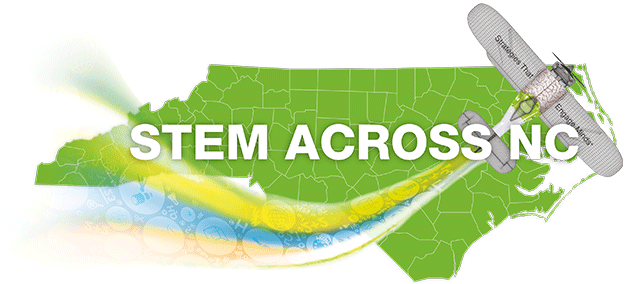Summer vacation isn’t what it used to be. Beach trips, pool days, and theme park trips aren’t the only activities filling weeks outside the classroom.
Instead, teachers and students mix work with play, taking advantage of summer programs that augment their knowledge of science, technology, engineering, and math (STEM). Through hands-on experiences, teachers learn better strategies for instructing students, and students see science touches most aspects of everyday life.
In fact, said Lisa Rhoades, senior program associate at the North Carolina Science, Mathematics, and Technology Education Center, summer STEM programs make science a real-life adventure.
“Teachers might not teach 12 months, but they do look for opportunities to refine their practice and learn new strategies,” she said. “Additionally, students stay engaged and avoid summer learning loss. Summer programs give them unique experiences not found in school.”
North Carolina offers several programs for both groups.
Examples for teachers and students are listed below.
Teacher Programs
These programs focus on giving teachers new instructional strategies. In most instances, the programs take place in the field.
North Carolina Center for Advancement In Teaching
Based at Western Carolina University in Cullowhee, N.C., the Center for Advancement In Teaching helps public school teachers master new classroom tactics to improve how they introduce science topics.
Among other programs, teachers can attend a four-day event in Ocracoke called Using Coastal Ecosystems to Enhance the Study of High School Biology. During the program, they partner with biologists and science experts to create lesson plans and demonstrations for high school students rooted in hands-on work with carbon/nitrogen cycles, energy pyramids, and biochemical processes in ecosystems.
Kenan Fellows Program for Teacher Leadership
During this three five-week summer internship teachers work with mentors in research and applied STEM settings, developing their STEM knowledge and leadership skills. The program is open to elementary-to-high school teachers.
Topics open to teachers are almost endless, including engineering, biology, chemistry, or materials science. At program’s end, teachers leave with a quiver full of ideas on making science more relatable to students.
Charlotte-Mecklenburg elementary teacher Philip Carey said he will take his innovation experience with Hyde Park Partners into his 4th-grade classroom.
“I instantly drew parallels between the work Hyde Park does in its engineering innovation chamber with the work I want my students to do in my classroom,” he said. “I want my students to fail fast, fail cheap, improve, and try again. I can’t wait to tell my students the work they’re doing is truly preparing them for the world outside.”
Part of the WakeEd Partnership, SummerSTEM gives up to 100 teachers hands-on experience, bringing real-world lessons into the classroom. Each school can send two educators.
Program leaders pair teachers with existing STEM companies, such as Biogen, LORD Corporation, RedHat, and SAS, putting them in STEM career positions. The interactive experience has teachers working with mentors in the field. Simultaneously, teachers sharpen their own skills, and mentors help them refine units of study and classroom lesson plans.
Ultimately, educators make a presentation at a STEM Symposium, much like a science fair.
Student Programs
Designed to help students maintain and enhance their knowledge, these programs also send students into the field for first-hand experiences.
SSEP @ Eastern Carolina University
Part of Burroughs Wellcome Fund’s Student Science Enrichment Program (SSEP), this year, Eastern Carolina University hosted a program for Greene County students who would be the first in their families to attend college. Being paired with a mentor with similar science or engineering interests boosted their excitement about and confidence in their research skills.
This year, Savyone Best, a junior at Greene Central High School designed a water-conserving shower head with teammates. They developed the concept from blueprints-to-production and received tips from professors about how to improve their product in the future.
Senior Evita Enrique echoed that enthusiasm, adding the endeavor prepared her for the next academic step.
“My experience with the SSEP program at ECU was amazing! I learned many skills, such as the process of electrophoresis, the process of inserting DNA into a plant, amongst other things,” she said. “This program not only helps students better understand the fundamentals of STEM, but it also exposes you to a whole new environment of college life.”
Located in Raleigh, SMILE (Science and Math Interactive Learning Experience) Camp provides hands-on interactions to elementary-to-high school students. The program offers 10 week-long camps for children ages 7-to-18.
Elementary school students learn how and why things work as they do, touching on chemistry, physics, and materials engineering while working with gears, magnets, and electricity.
Projects are more complex for middle school students. They tackle 3D modeling, rocketry, and mobile app development, working with metallic crystals, redox reactions, and liquid nitrogen.
High school students design and build their own machines. In the past, participants built an internal combustion engine.
This camp supports the push for more girls to enter STEM fields. Hosted by Duke University, this program, for rising 5th- and 6th-grade girls, brings participants on campus for hands-on activities led by undergraduate and graduate female counselors and mentors.
During the five-day program, 50 girls engage in research activities based on a theme. Through last year’s forensic science theme, they learned about fingerprint analysis, DNA extraction from cheek cells, blood splatter analysis, footprint impressions, and powder analysis. Participants also toured other research projects and facilities on campus.
By Whitney Palmer

That’s an amazing piece of write up for understanding the importance of the Summer Enrichment Programs. You have written quite an impressive and well-detailed article for the Summer Program aspirants. The points that have been mentioned here will surely help the young lads to start their career journey and enhance their self-confidence. I was looking for a Summer Program recommendation for my younger sibling which helps her utilize this summertime as well as follow her passion along.
Thank you so much for putting everything in a detailed manner.